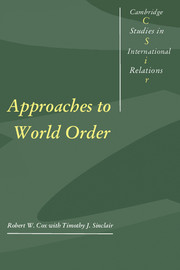Book contents
- Frontmatter
- Contents
- Preface
- Acknowledgements
- Part I Overviews
- Part II Theory
- Part III Interpretations
- 10 The global political economy and social choice (1991)
- 11 “Real socialism” in historical perspective (1991)
- 12 Structural issues of global governance: implications for Europe (1991)
- 13 Middlepowermanship, Japan, and future world order (1989)
- 14 Production and security (1993)
- 15 Global perestroika (1992)
- Part IV Multilateralism
- Complete bibliography of works by Robert W. Cox to 1995
- Index of names
- Index of subjects
- CAMBRIDGE STUDIES IN INTERNATIONAL RELATIONS
12 - Structural issues of global governance: implications for Europe (1991)
Published online by Cambridge University Press: 05 June 2012
- Frontmatter
- Contents
- Preface
- Acknowledgements
- Part I Overviews
- Part II Theory
- Part III Interpretations
- 10 The global political economy and social choice (1991)
- 11 “Real socialism” in historical perspective (1991)
- 12 Structural issues of global governance: implications for Europe (1991)
- 13 Middlepowermanship, Japan, and future world order (1989)
- 14 Production and security (1993)
- 15 Global perestroika (1992)
- Part IV Multilateralism
- Complete bibliography of works by Robert W. Cox to 1995
- Index of names
- Index of subjects
- CAMBRIDGE STUDIES IN INTERNATIONAL RELATIONS
Summary
Europe and the world
… The future of Europe has been considered here in terms of the options for forms of state and society as they are conditioned by existing social forces within Europe – forces which are the European manifestation of global tendencies discussed in the first part of this essay. Europe's relationship to the rest of the world will depend upon how Europeans define their own social and political identity by making their choices among these options; but at the same time external influences from the world system are affecting the internal European balance of social forces in the making of these choices.
The emerging European macro-region will have a formal political structure different from the more informal authority structure of the other two macro-regions, the US and Japanese spheres. Whereas the United States and Japan are economically and politically dominant in their spheres, the European core area in economic terms is a corridor running from Turin and Milan in the south through Stuttgart in the east and Lyons in the west up to the low countries and the southeast of England, spanning seven states. In political terms authority rests in a consultative confederalism in which participant states have often differing policy preferences and micro-regions are asserting their autonomy.
- Type
- Chapter
- Information
- Approaches to World Order , pp. 237 - 240Publisher: Cambridge University PressPrint publication year: 1996
- 2
- Cited by

